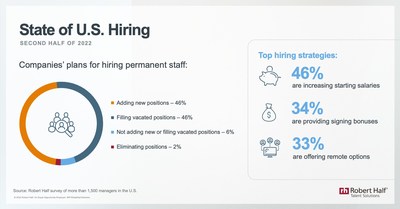MENLO PARK — The job market will remain strong for the latter part of 2022, according to research from talent solutions and business consulting firm Robert Half.
According to the company’s State of U.S. Hiring Survey of more than 1,500 managers, 46% of respondents anticipate adding new permanent positions during the second half of the year; another 46% expect to fill vacated positions and only 8% foresee hiring freezes or layoffs.
|
Companies’ Plans for Hiring Permanent Staff |
|||
|
Second Half |
First Half |
Second Half |
|
|
Adding new positions |
51 % |
65 % |
46 % |
|
Filling vacated positions |
48 % |
33 % |
46 % |
|
Not adding new or filling vacated positions |
2 % |
2 % |
6 % |
|
Eliminating positions |
0 % |
1 % |
2 % |
Increased Demand for Contract and Early-Career Talent
Forty-five percent of managers across practice areas plan to bring in more contract professionals by year-end — especially in technology (60%) and finance and accounting (54%). In addition, 72% of employers intend to hire more entry-level or early-career professionals.
“Despite talk of an economic slowdown, many companies remain in hiring mode — and professionals with in-demand skills continue to have options,” said Robert Half senior executive director Paul McDonald. “In addition to staffing critical functions, employers are increasingly turning to contract talent to stay nimble while keeping projects moving forward and productivity high.”
Top Hiring Challenges and Strategies
According to the research, 88% of managers said it’s challenging to find skilled professionals, primarily due to a lack of qualified talent (38%) and candidates’ salary expectations being higher than what their company is willing to offer (22%).
In turn, employers who have the resources are using a range of recruiting tactics to win over skilled workers:
- 46% are increasing starting salaries.
- 34% are providing signing bonuses.
- 33% are offering remote options.
- 31% are evaluating candidates outside of their company’s geography and allowing new hires to live anywhere.
- 28% are loosening education, skills or experience requirements.



